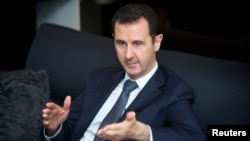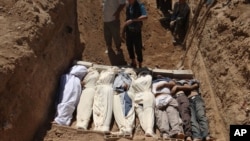BEIRUT, LEBANON —
Syrian President Bashar al-Assad’s acceptance in principle of a Russian proposal to place his deadly chemical weapons under international supervision is likely facing resistance from his own military, analysts say. But Assad may have had little choice because of Iranian and Russian pressure.
Civilian supporters in Damascus of President Bashar al-Assad expressed relief this week when he accepted a Russian proposal to place his regime’s chemical weapons under international supervision.
His acceptance has led to international diplomacy which has put off U.S. plans for a strike against Syrian forces for their alleged chemical attack last mount outside Damascus.
For the respite civilians were thankful. But not everyone in the Assad regime is pleased.
Observers of the Syrian military establishment said hardliners would likely resist as international diplomacy advanced.
Aram Nerguizian is with the Center for Strategic and International Studies, a Washington-based think tank.
“You are certainly going to see some consternation within the regime. I have no doubt there will be pushback within the security establishment on issues like giving up a trump card, chemical weapons,” said Nerguizian.
Yezid Sayigh, a senior associate at the Carnegie Endowment’s Middle East Center, agreed.
“For some of the regime, the mere fact of losing the chemical weapons capability, which could be the outcome of this, might be something they see as very dangerous and threatening,” said Sayigh.
While acknowledging it was difficult to know what went on inside Assad's secretive inner-circles, Sayigh believed the Syrian president may be blaming his military chiefs for the alleged August 21 attack, the largest use so far of nerve agents in the two-and-half year civil war.
The Assad regime denied orchestrating that attack and blamed the rebels. The U.S. said it was sure Syrian forces carried out the attack, which it said killed 1,400 people.
Human rights groups said there have been previous chemical attacks by Syrian government forces during the war. But they said these attacks were smaller in scale, resulting in fewer casualties.
Some experts suspected last month's attack may have been misjudged in terms of trajectories and wind conditions and the amount of nerve agent used. If so, it allowed Assad to place blame on his military, Sayigh said.
He said, “If this was a case of a military operation and there was a misjudgment resulting in unexpected and unplanned and unwanted civilian casualties, then Bashar al-Assad might turn around and say ‘you guys overplayed your hand; you got your trajectories wrong.’ He could say ‘well, it is your stupidity that put us here and this is now a matter of damage limitation.’”
While international negotiations were under way, analysts said some in the Syrian security establishment would urge Assad to defy the U.S. and let the Americans strike, said military expert Nerguizian. But, he said, there would be countervailing pressure on Assad from his foreign backers, Russia and Iran.
“The forces that are in the Assad regime can compete, can disagree, but it is very clear to most observers that this is something that enjoys the full backing of Iran, enjoys the full backing of Moscow, at least in terms of rhetoric and as a mechanism for de-escalating tensions,” said Nerguizian.
Russian and Iranian patronage is crucial for the survival of the Assad government. Russia said there was "every reason" to blame rebels for the chemical attacks. And Iran has urged West to seek a diplomatic settlement of Syria crisis.
Civilian supporters in Damascus of President Bashar al-Assad expressed relief this week when he accepted a Russian proposal to place his regime’s chemical weapons under international supervision.
His acceptance has led to international diplomacy which has put off U.S. plans for a strike against Syrian forces for their alleged chemical attack last mount outside Damascus.
For the respite civilians were thankful. But not everyone in the Assad regime is pleased.
Observers of the Syrian military establishment said hardliners would likely resist as international diplomacy advanced.
Aram Nerguizian is with the Center for Strategic and International Studies, a Washington-based think tank.
“You are certainly going to see some consternation within the regime. I have no doubt there will be pushback within the security establishment on issues like giving up a trump card, chemical weapons,” said Nerguizian.
Yezid Sayigh, a senior associate at the Carnegie Endowment’s Middle East Center, agreed.
“For some of the regime, the mere fact of losing the chemical weapons capability, which could be the outcome of this, might be something they see as very dangerous and threatening,” said Sayigh.
While acknowledging it was difficult to know what went on inside Assad's secretive inner-circles, Sayigh believed the Syrian president may be blaming his military chiefs for the alleged August 21 attack, the largest use so far of nerve agents in the two-and-half year civil war.
The Assad regime denied orchestrating that attack and blamed the rebels. The U.S. said it was sure Syrian forces carried out the attack, which it said killed 1,400 people.
Human rights groups said there have been previous chemical attacks by Syrian government forces during the war. But they said these attacks were smaller in scale, resulting in fewer casualties.
Some experts suspected last month's attack may have been misjudged in terms of trajectories and wind conditions and the amount of nerve agent used. If so, it allowed Assad to place blame on his military, Sayigh said.
He said, “If this was a case of a military operation and there was a misjudgment resulting in unexpected and unplanned and unwanted civilian casualties, then Bashar al-Assad might turn around and say ‘you guys overplayed your hand; you got your trajectories wrong.’ He could say ‘well, it is your stupidity that put us here and this is now a matter of damage limitation.’”
While international negotiations were under way, analysts said some in the Syrian security establishment would urge Assad to defy the U.S. and let the Americans strike, said military expert Nerguizian. But, he said, there would be countervailing pressure on Assad from his foreign backers, Russia and Iran.
“The forces that are in the Assad regime can compete, can disagree, but it is very clear to most observers that this is something that enjoys the full backing of Iran, enjoys the full backing of Moscow, at least in terms of rhetoric and as a mechanism for de-escalating tensions,” said Nerguizian.
Russian and Iranian patronage is crucial for the survival of the Assad government. Russia said there was "every reason" to blame rebels for the chemical attacks. And Iran has urged West to seek a diplomatic settlement of Syria crisis.













